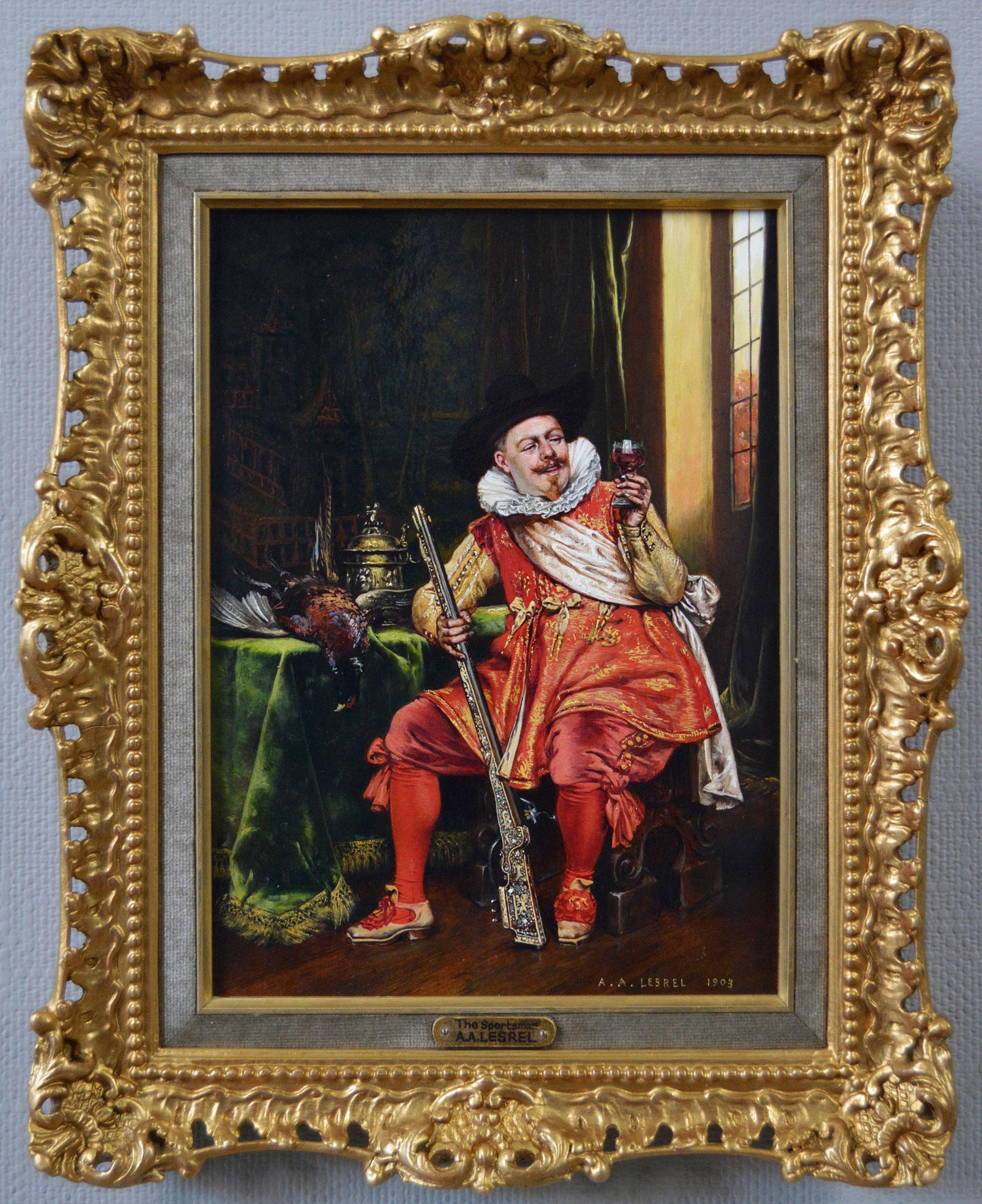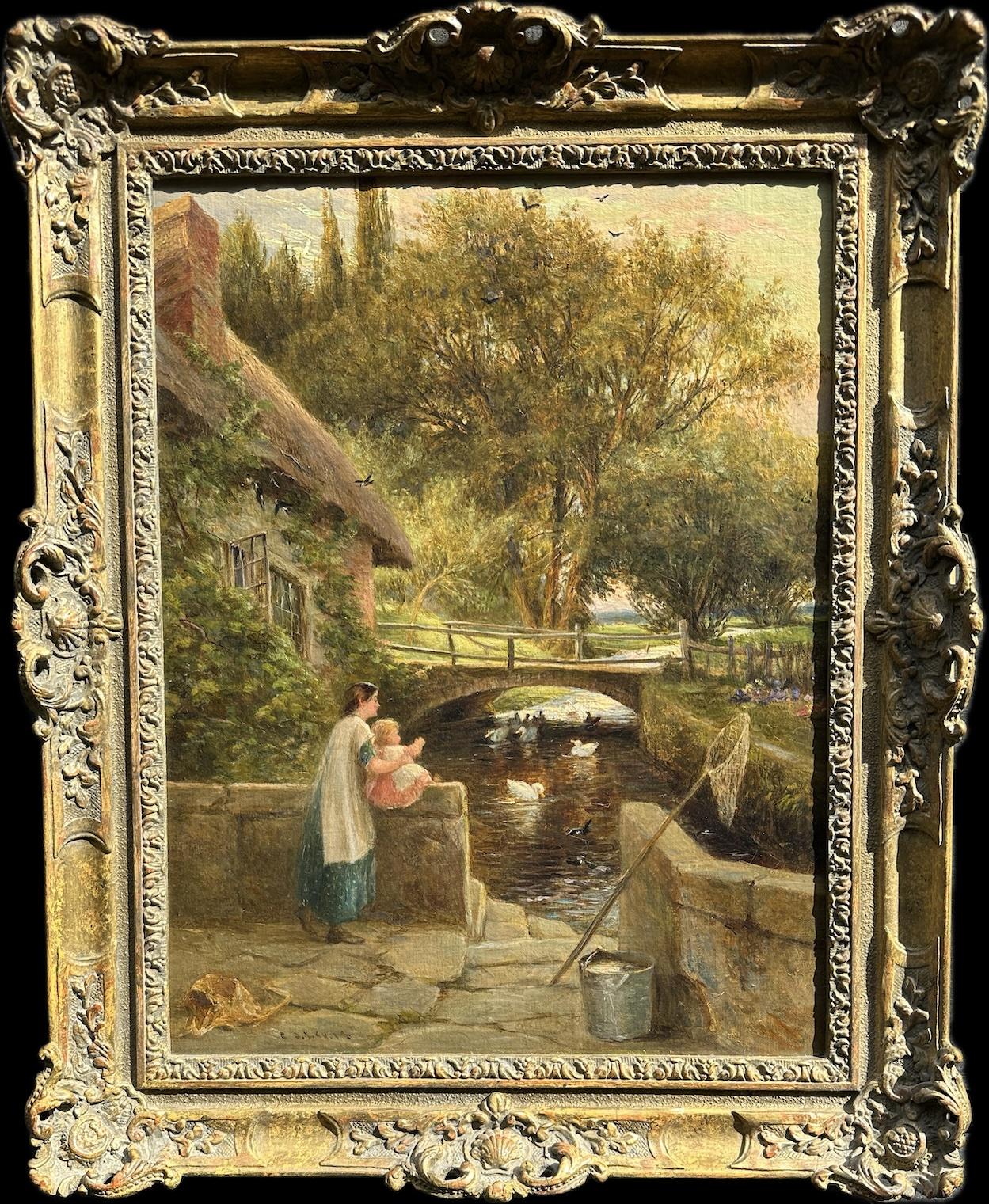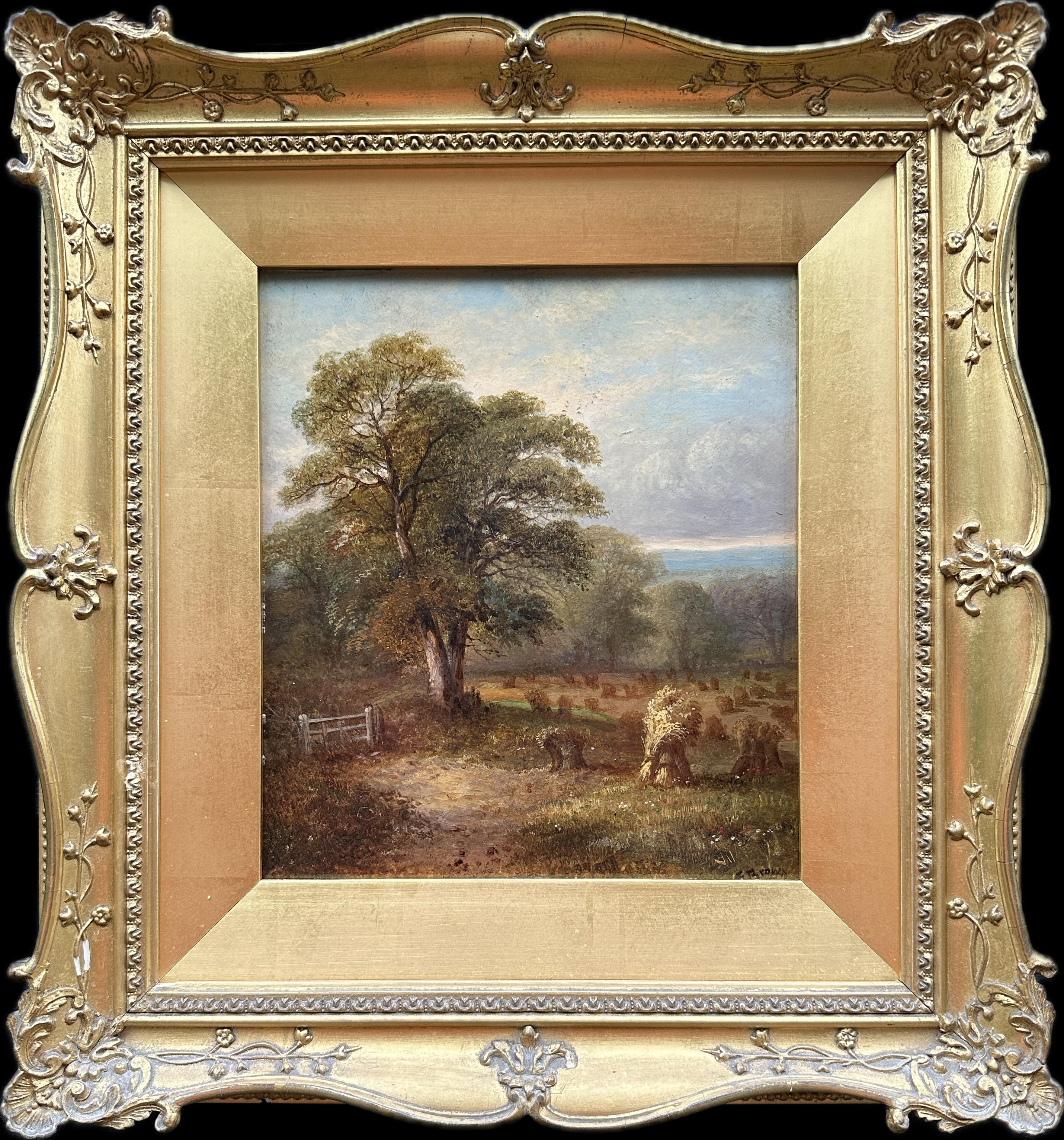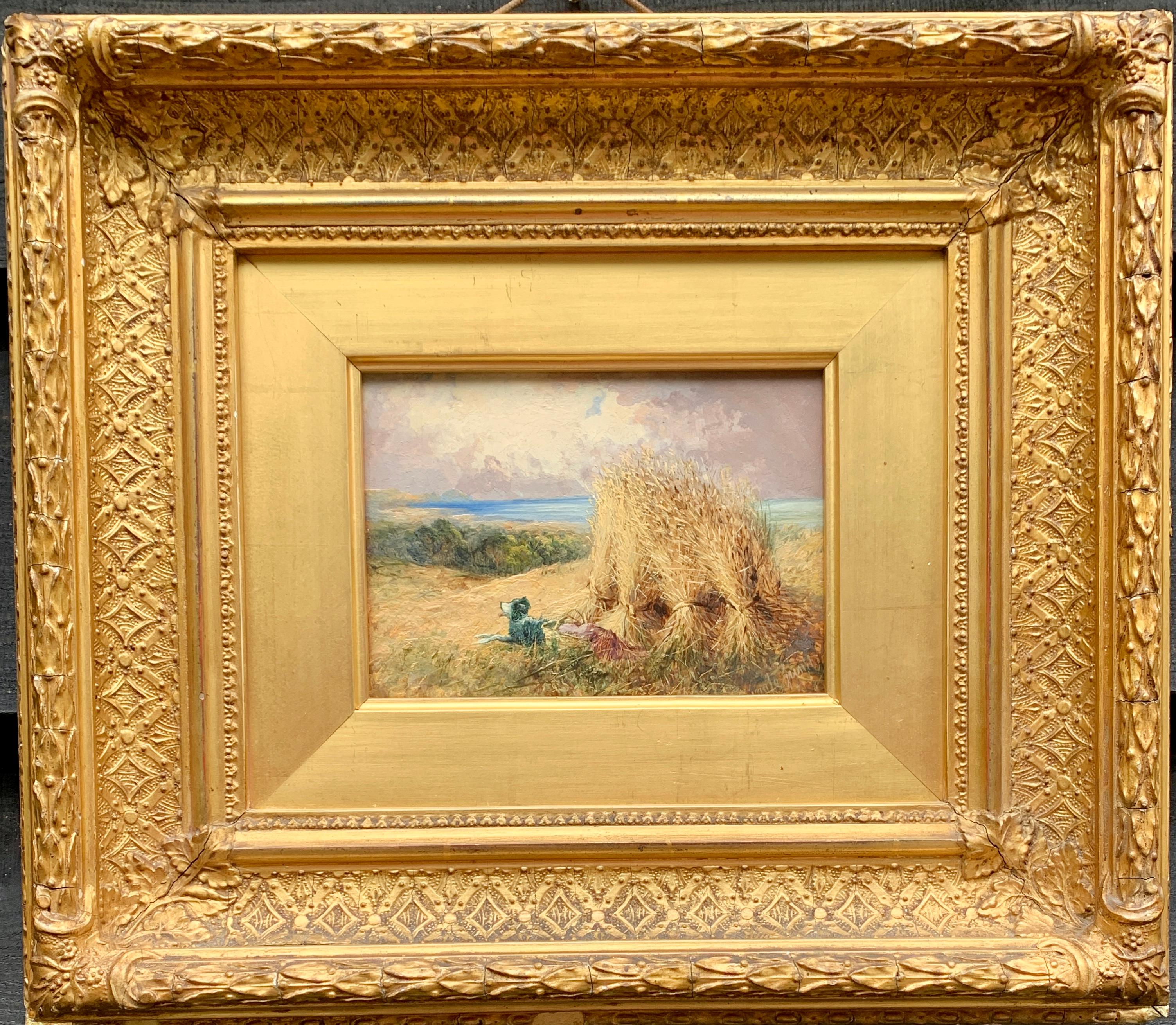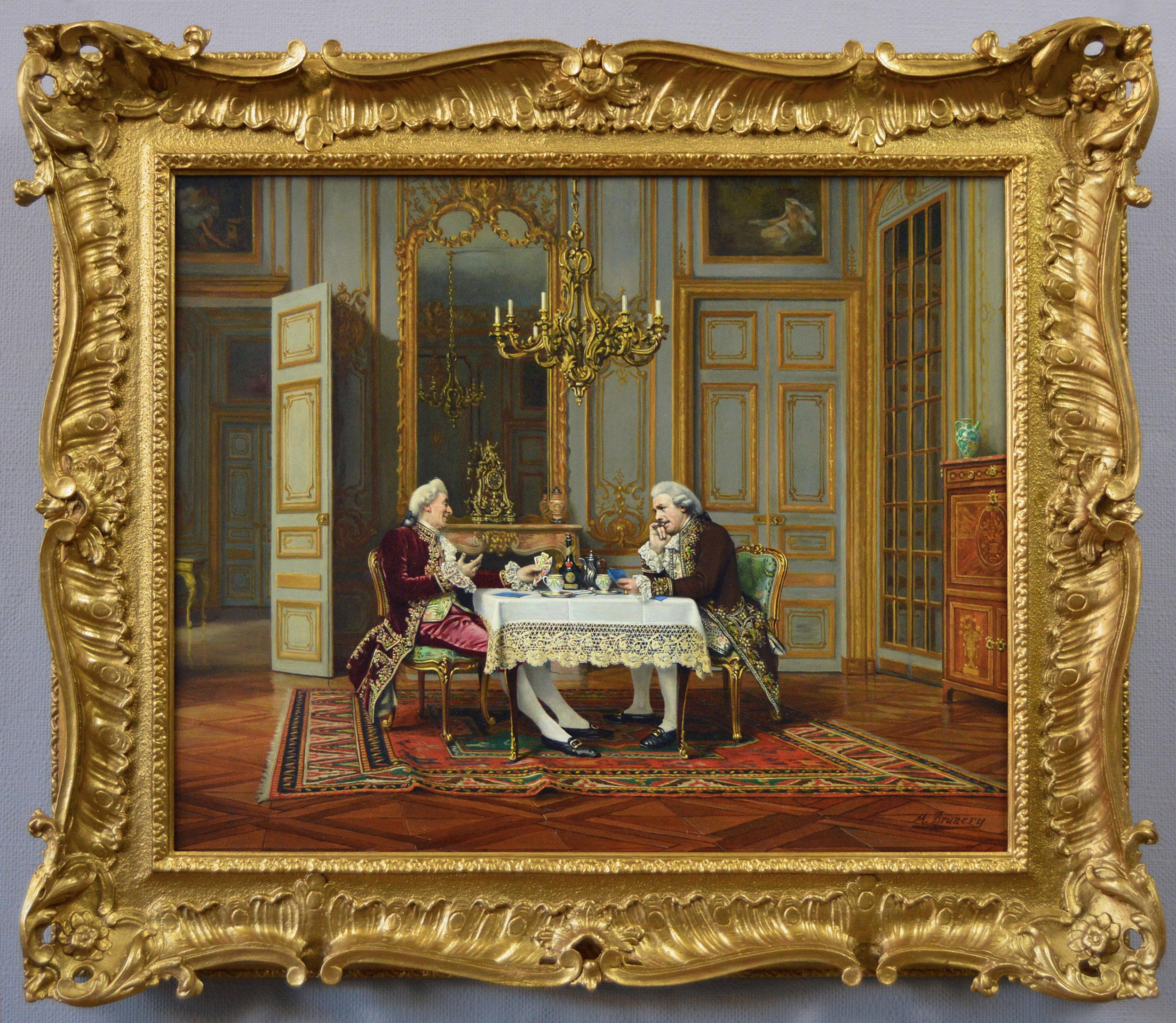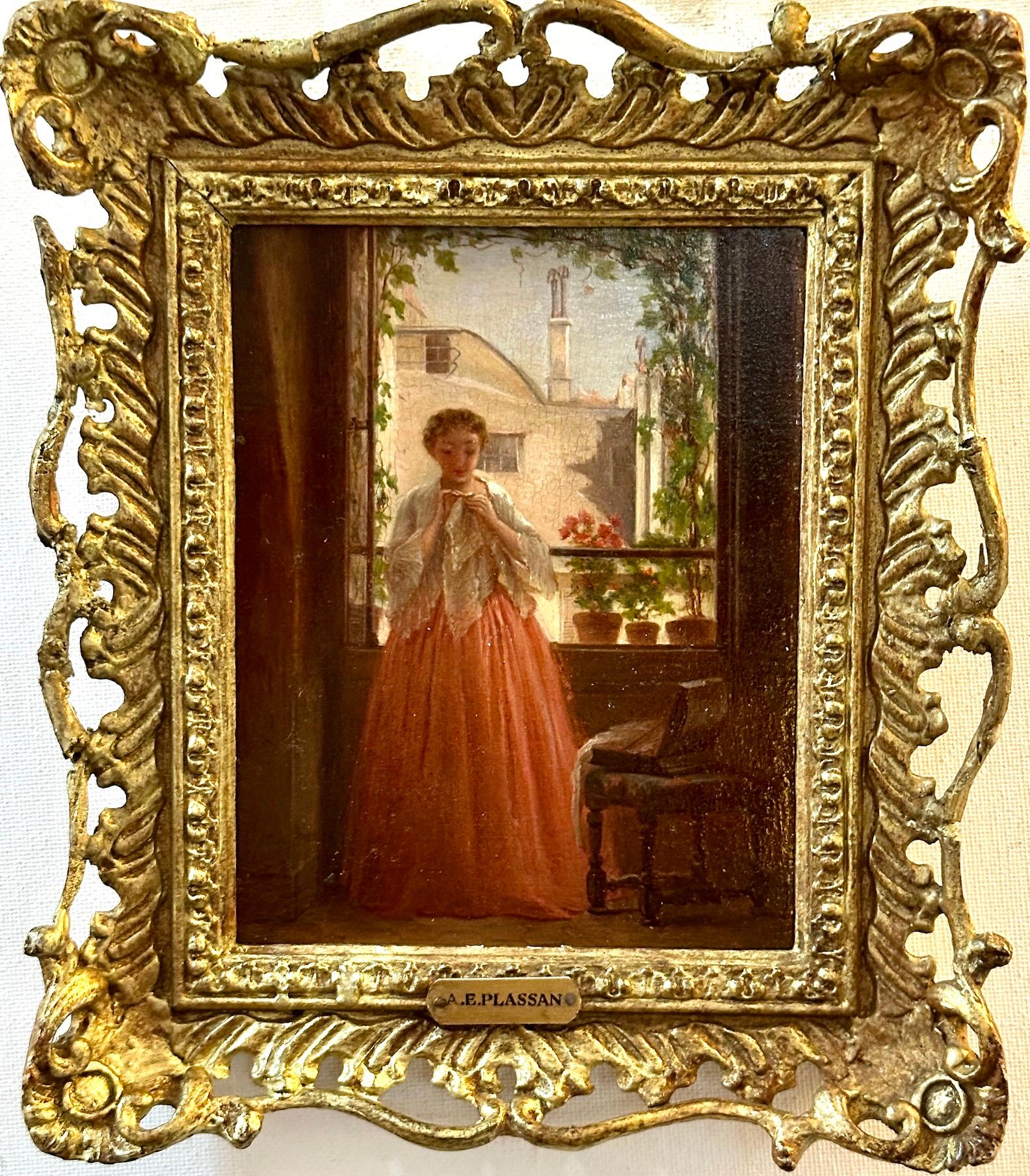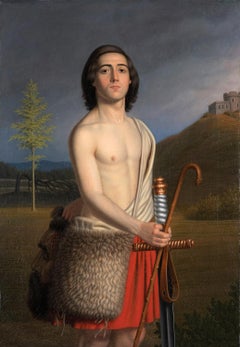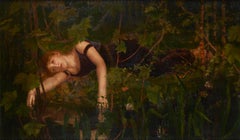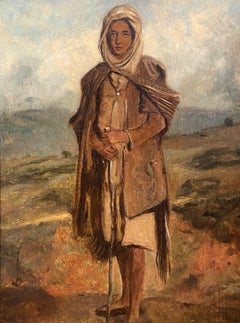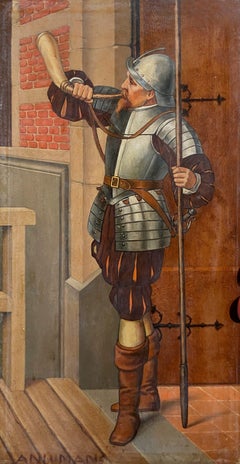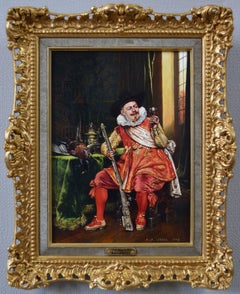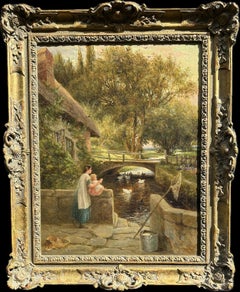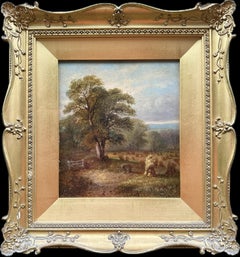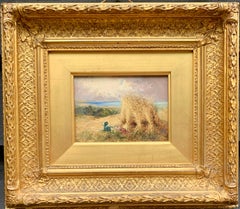Items Similar to Study for Eastward Ho!, Oil on Panel 19th Century Painting
Want more images or videos?
Request additional images or videos from the seller
1 of 7
Henry Nelson O'NeilStudy for Eastward Ho!, Oil on Panel 19th Century Painting
About the Item
Oil on panel
Image size: 20 x 16 inches (51 x 40.5 cm)
Handmade gilt frame
Provenance
Family estate
This preliminary oil sketch for one of O'Neil's most famous works, "Eastward Ho!", was first exhibited at the Royal Academy in 1858. The full-scale painting depicts soldiers on board a ship at Gravesend, destined for service in India during the Indian Mutiny, bidding farewells to loved ones. The work changed the artist's career and became one of the most popular images in Victorian art. Following its first public appearance at the Royal Academy in 1858, a tour of Britain was organised for the picture, during which time an estimated 540,000 people came to see it. O'Neil made a companion painting, entitled Home Again, depicting the return of the same troops, which was exhibited at the Royal Academy in the following year.
In 1860 the two paintings were exhibited side by side in Piccadilly, London where viewers had to pay six pence to view the two works.
The present work shows the artist working on details of the composition, which were significantly altered in the finished version. For example, the direction of the composition is in reverse, and the female figure in the foreground is shown with her face covered by a handkerchief to hide her anguish, whereas in the final version she is given assistance down the gangplank by an old salt. The motif of the woman with her face buried in a handkerchief is transferred to another figure further up the gangplank.
The painting however was well received with the Illustrated London News describing the work and its popularity as:
“….a national epic. No wonder it is so popular that such crowds assemble around it, scanning every feature of the various actors, till at last they begin to imagine themselves present at, and participators in, the scene…”
The newspaper of the day, The Times, put it:
“….Hope and aspiration are busy among these departing soldiers, and if mothers and wives, and sisters and sweethearts, go down the side sorrowing, it is a sorrow in which there is no despair, and no stain of sin and frailty…..”
It is a poignant scene for despite the bravado and sense of duty of the young men going off to fight their just cause with nothing but a rousing sense of duty, we observe their loved ones who are going to be left behind reluctantly letting their fighting men’s fingers slip from their grasp as they move down the gang plank. For the men we can only see in their faces optimism and patriotism whilst in the faces of the women we see fear and a sense of foreboding.
The Artist
O’Neil was born in Russia to English parents in 1817. He returned to England at the age of six and when he was nineteen years of age studied at the Royal Academy Schools.
In the 1840’s O’Neil was a co-founder of The Clique, which was a group of like-minded young artists, based around the St John’s Wood area of London, who regularly met to peruse each other’s works and offer their own critiques. The coming together of this group was in some ways an act of rebellion against the Royal Academy and in what they saw as its imposition of artistic restrictions. This group wanted to add more realism to their work. They wanted their works to have greater emotional intensity which at the time was frowned upon by the Academy establishment. This group of artists denounced the Pre-Raphaelite Brotherhood and their works and O’Neil was the most vociferous in his opposition to their art. The Clique eventually broke up but Henry O’Neil still believed in its principles and he continued to embrace highly emotional scenes in his works.
O’Neil fared well as an artist and managed to have almost a hundred paintings accepted into exhibitions at the Royal Academy, an establishment, as a member of The Clique, he once criticised. He was made an Associate of the Academy two years after exhibiting these two featured paintings. O’Neil died 1880 aged 63.
- Creator:Henry Nelson O'Neil (1817 - 1880)
- Dimensions:Height: 20 in (50.8 cm)Width: 16 in (40.64 cm)
- More Editions & Sizes:1 of 1Price: $29,140
- Medium:
- Movement & Style:
- Period:
- Condition:
- Gallery Location:London, GB
- Reference Number:1stDibs: LU52412888882
About the Seller
5.0
Gold Seller
Premium sellers maintaining a 4.3+ rating and 24-hour response times
Established in 2007
1stDibs seller since 2014
80 sales on 1stDibs
Typical response time: 4 hours
- ShippingRetrieving quote...Shipping from: London, United Kingdom
- Return Policy
Authenticity Guarantee
In the unlikely event there’s an issue with an item’s authenticity, contact us within 1 year for a full refund. DetailsMoney-Back Guarantee
If your item is not as described, is damaged in transit, or does not arrive, contact us within 7 days for a full refund. Details24-Hour Cancellation
You have a 24-hour grace period in which to reconsider your purchase, with no questions asked.Vetted Professional Sellers
Our world-class sellers must adhere to strict standards for service and quality, maintaining the integrity of our listings.Price-Match Guarantee
If you find that a seller listed the same item for a lower price elsewhere, we’ll match it.Trusted Global Delivery
Our best-in-class carrier network provides specialized shipping options worldwide, including custom delivery.More From This Seller
View AllDavid with the Head of Goliath, 19th Century Victorian Oil
By John Rogers Herbert
Located in London, GB
John Rogers Herbert RA
1810- 1890
Oil on canvas, dated '1850' lower right on sword strap
Image size: 33 ½ x 23 ½ inches
Gilt Watts frame
This striking painting, depicts David as a y...
Category
1850s Victorian Figurative Paintings
Materials
Oil
Ophelia, Victorian 19th Century Royal Academy Oil Painting
Located in London, GB
Oil on canvas, signed lower right
Image size: 33 1/2 x 56 1/2 inches (85 x 143 cm)
Original gilt frame
Provenance
With the artist's son, Millie Dow Stott Esq., until 1912.
Artist's Studio Sale, Christies, November 1913.
Private Collection
Exhibitions
London, Royal Academy, 1895, no. 679.
Paris, Societe de la Nationale des Beaux-Arts, 1896, no. 1179.
Berlin, VII Internationale Kunstausstellung 1897. no. 3533.
Manchester, City of Manchester Art Gallery, 1912, no. 339.
In the 1890s William Stott exhibited regularly at the Royal Academy, mainly highly decorative works with subjects derived from classical mythology and literature. This painting was Stott's 1895 entry to the Royal Academy and was subsequently exhibited at the Paris Salon of 1896 and then on to the Berlin, VII Internationale Kunstausstellung 1897. Shakespeare was a favourite source for Victorian painters, and the tragic romance of Ophelia, from Hamlet, was an especially popular subject, featuring regularly in the Royal Academy exhibitions.
The most popular and iconic image of Ophelia's death was, and is to this day, John Everett Millais's 1851 painting showing the confused and tragic Ophelia floating downstream on her back in a state of mad ecstasy, arms raised in a gesture of inevitable submission. However, although Stott chose not to pastiche this image, it seems highly likely that he was prompted to take up this subject, which had almost become a 'rite of passage' among Victorian painters, by the fact that in 1894 Millais's Ophelia was presented to the National Gallery of British Art by Sir Henry Tate.
It appears that Stott was much influenced by John William Waterhouse...
Category
Late 19th Century Victorian Figurative Paintings
Materials
Canvas, Oil
The Bedouin, European School Oil Painting on panel, Original Frame
Located in London, GB
Oil on panel
Image size: 12 1/2 x 9 1/4 inches (31.75 x 23.5 cm)
Original frame
This is a captivating portrait of a young Bedouin. The painting has a sensitive and cohesive colour p...
Category
19th Century Figurative Paintings
Materials
Oil, Wood Panel
The Palace Guard, Oil on Panel Signed Painting
Located in London, GB
Oil on panel, signed bottom left
Image size: 6 x 11 inches (15.25 x 28 cm)
This painting depicts a 16th century palace guard standing outside of an open door, wearing a set of armou...
Category
19th Century Figurative Paintings
Materials
Oil, Panel
Man Smoking on a Barrel
By David Teniers the Younger
Located in London, GB
Man Smoking on a Barrel
Circle of David Teniers the Younger
1610-1690
Oil on oak panel
Image size: 9 1/2 x12 1/2 inches (23.5 x 32 cm)
Handmade contemporary frame
Here in this tave...
Category
17th Century Flemish School Figurative Paintings
Materials
Oil, Panel
A Young Woman Drawing Water From A Well Oil Oak Panel
Located in London, GB
Circle of Gerrit Dou
1613-1675
A Young Woman Drawing Water From A Well
Oil on oak panel
Image size: 12 1/2 x 9 3/4 inches (32 x 25 cm)
Dutch ripple frame
Wax seal verso for Baron Mor...
Category
17th Century Dutch School Figurative Paintings
Materials
Oil, Wood Panel
You May Also Like
Historical genre sporting oil painting of a gentleman hunter
Located in Nr Broadway, Worcestershire
Adolphe Alexandre Lesrel
French, (1839-1929)
The Sportsman
Oil on panel, signed & dated 1903
Image size: 9.75 inches x 7 inches
Size includin...
Category
19th Century Victorian Figurative Paintings
Materials
Oil, Panel
English landscape 19th century Mother and child by a cottage, looking at Ducks
By Charles James Lewis
Located in Woodbury, CT
This is a wonderful outstanding quality scene of an English cottage garden scene with a mother and Child looking at the Ducks swimming before them.
The piece's quality is amazing with a real understanding of how to make a desirable painting. Charles James Lewis, was baptized at St Giles, Camberwell, London on 6 October 1830, son of Charles Thomas Lewis, a clerk at the Bankank of England, and his wife Sarah Hyde née Bennett (1805-1872), who married at Tottenham, London on 11 June 1825. In 1851, a 20-year-old student in painting, living at 17 Nelson Square, Camberwell with his 52-year-old married father Charles and a 64-year-old 'unmarried' Sarah Lewis. Charles married at Camberwell in 1854, Mary Ann Matilda Hammond Shetton, and in 1871, a 50-year-old landscape...
Category
1860s Victorian Landscape Paintings
Materials
Oil, Panel
19th century English landscape with trees, a Harvest Field during Summertime
Located in Woodbury, CT
19th century English landscape with trees, a Harvest Field during Summertime.
A wonderful classic English landscape dating from the middle of the 19th century. This style of paintin...
Category
1860s Victorian Landscape Paintings
Materials
Oil, Wood Panel
Antique English Harvest landscape with corn stacks, dog and view of the sea
By Thomas Dingle Junior
Located in Woodbury, CT
Outstanding English Victorian 19th century Harvest landscape.
Thomas Simon Dingle was the son of Thomas Dingle (1818-1904), known as a London landscape painter, but who, according t...
Category
1890s Victorian Landscape Paintings
Materials
Oil, Wood Panel
Historical genre oil painting of two gentlemen playing a game of cards
By Marcel Brunery
Located in Nr Broadway, Worcestershire
Marcel Brunery
French, (1893-1982)
A Good Hand
Oil on panel, signed
Image size: 18.75 inches x 23.5 inches
Size including frame: 26.75 inches x 31.5 inches
Provenance: Frost & Reed
...
Category
Early 20th Century Victorian Figurative Paintings
Materials
Oil, Panel
French 19th century, Lady looking at a jewel in an interior, South of France
Located in Woodbury, CT
Antoine Emile Plassan (1817-1903), a French painter of genre works, portraits and landscapes, was born in Bordeaux. He exhibited frequently at the Salon and was awarded medals in 185...
Category
1870s Victorian Figurative Paintings
Materials
Oil, Wood Panel
Recently Viewed
View AllMore Ways To Browse
19th Century Oil On Wood
English Wood Panel
Victorian Wood Panel
Old Ships Oil Painting
Antique Indian Paintings
19th Century Oil Painting Ship
Victorian Woman Painting
Indian Painted Panels
19th Century Painting India
India Wood Panel
16x20 Picture Frame
19th Century Indian Painting
19th Century Indian Artists
Antique Nelson
Antique Go Board
Antique Picture Viewer
Old Antique Wood Picture Frames
16x20 Gilt Frame
